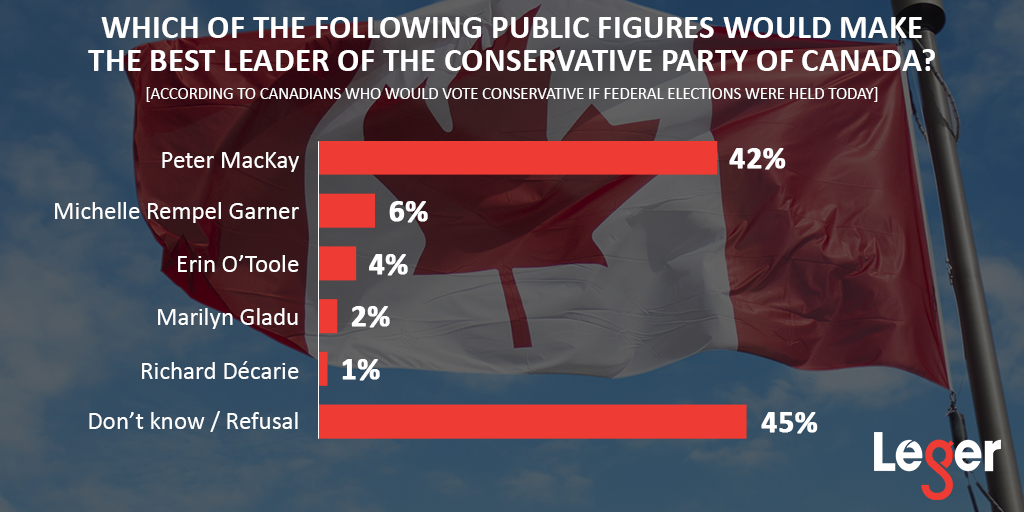The political scene in Canada as we head into 2020
2019 was an eventful year, with several provincial elections and, of course, the main event in October: the federal election that resulted in a minority Liberal government in Ottawa.
According to our latest national poll released February 1, 2020, the Liberals and Conservatives are statistically tied in terms of support among decided voters. The Liberals are at 34% of decided voter support (up a point from the election), and the Conservatives are at 32% (down 2 points from the election), meaning little would change in the House makeup with another election. On Parliament Hill, it may be more interesting to watch the race to become the next leader of the Conservative party.
Who will lead the Conservatives in the next election?
What began as a race of many notable names considering a run for the CPC leadership—Jean Charest, Rona Ambrose, Pierre Poilievre—has now become a race with a clear front runner, Peter MacKay, and several others, including Erin O’Toole and Marilyn Gladu, hoping to gain significant ground.
In our recent poll, we asked voters their opinions on a short list of confirmed and potential CPC leadership candidates. Among Canadians who would vote Conservative if elections were held that day, it is clear that Peter MacKay is the one to beat and others in the race or contemplating entering will have their work cut out for them in the months ahead of the June 27, 2020 vote.
While a poll of ‘supporters’ represented in the table above is not an entirely accurate reflection of the actual CPC voting membership, it does provide a reasonable sense of MacKay’s standing. This standing, and the fact that MacKay has already submitted his nomination papers with 3000 Party member signatures and his required registration fees, suggests MacKay is well organized and will be a formidable opponent in this race.
If there is a silver lining in our poll for the O’Toole, Gladu and potentially Rempel-Garner camps, it is that there is still a considerable pool of voters who are unsure who would make the best Tory leader, even among CPC supporters (45%). MacKay may have a lead, but there is room for others to grow.
Keep an eye out for increased media scrutiny of MacKay’s campaign announcements and heightened attacks on his policy positions, both past and present. Look for the Liberals to begin preparations for the next election campaign by reminding voters of some of MacKay’s voting history while a member of the Stephen Harper government.
National party leadership & being bilingual
Our poll provides some insights on another potential challenge to MacKay’s ascendency to the CPC leadership: his ability to communicate in both official languages. We asked Canadians whether the next Conservative leader should be bilingual or not. CPC supporters are split almost down the middle on this question: 48% indicate the leader should be bilingual, versus 50% who say the leader doesn’t have to be bilingual, which means this issue is likely not going to be a significant issue for the membership.
However, nationally, 62% of Canadians said that the next CPC leader should be bilingual. Considering that a majority of voters in the seat rich provinces of Quebec and Ontario say the next CPC leader should be bilingual (87% and 56% respectively), one can suspect MacKay will be working on his French over the course of the campaign.
Election watch in the provinces
In terms of provincial elections in 2020, only Saskatchewan’s is certain, scheduled for November 2nd of this year. Premier Moe looks to be in good shape going into the election, having successfully transitioned the Saskatchewan Party leadership from the very popular Brad Wall. In a Leger poll conducted in late November of last year, Premier Moe’s net approval rating was a plus 12 among Saskatchewan residents, which placed him 4th highest in terms of approval among the country’s Premiers.
While elections are not a certainty, the situations in British Columbia and New Brunswick should be watched closely, as both governments are in the second year of their minority government situation (which is often the ‘shelf life’ for a minority government). Our November 2019 poll showed BC’s Premier Horgan in a strong position while Premier Higgs in New Brunswick had some work to do bring up his awareness levels.
You’ll be the first to receive more exclusive content like this in our future newsletters. Leger helps you know Canadians! Sign up to receive our newsletter.




